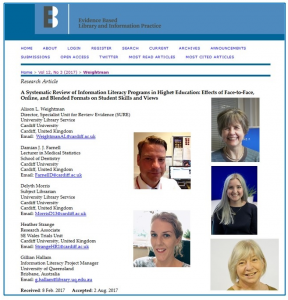 A systematic review, published in September this year, has found compelling evidence that information literacy training is effective and well received across a range of delivery formats. Below, Dr. Alison Weightman of Cardiff University gives us a summary of the conclusions drawn from the systematic review, the full results of which were recently published in Evidence Based Library and Information Practice.
A systematic review, published in September this year, has found compelling evidence that information literacy training is effective and well received across a range of delivery formats. Below, Dr. Alison Weightman of Cardiff University gives us a summary of the conclusions drawn from the systematic review, the full results of which were recently published in Evidence Based Library and Information Practice.
Evidence from systematic reviews a decade ago suggested that face-to-face and online methods to provide information literacy training in universities were equally effective in terms of skills learnt, but there was a lack of robust comparative research. The objectives of this review were (1) to update these findings with the inclusion of more recent primary research; (2) to further enhance the summary of existing evidence by including studies of blended formats (with components of both online and face-to-face teaching) compared to single format education; and (3) to explore student views on the various formats employed.
Following a comprehensive search for publications from January 1995 to October 2016, exploring skill outcomes for students enrolled in higher education programs, 33 studies were included, of which 19 also contained comparative data on student views. Where feasible, meta-analyses were carried out to provide summary estimates of skills development and a thematic analysis was completed to identify student views across the different formats.
A large majority of studies (27 of 33; 82%) found no statistically significant difference between formats in skills outcomes for students. Of 13 studies that could be included in a meta-analysis, the standardized mean difference (SMD) between skill test results for face-to-face versus online formats was -0.01 (95% confidence interval -0.28 to 0.26). Of ten studies comparing blended to single delivery format, 70% found no statistically significant difference between formats, and the remaining studies had mixed outcomes. From the limited evidence available across all studies, there is a potential dichotomy between outcomes measured via skill test and assignment (course work) which is worthy of further investigation. The thematic analysis of student views found no preference in relation to format on a range of measures in 14 of 19 studies (74%). The remainder identified that students perceived advantages and disadvantages for each format but had no overall preference.
Further research looking at blended versus single format methods, and the time implications for each, as well as comparing assignment to skill test outcomes would be valuable. Future studies should adopt a methodologically robust design (such as the randomized controlled trial) with a large student population and validated outcome measures.
For the full article see: Weightman AL, Farnell DJJ, Morris D, Strange H, Hallam G. A systematic review of information literacy programs in higher education: Effects of face-to-face, online, and blended formats on student skills and views. Evidence Based Library and Information Practice 2017; 12(3): 20-55 doi: http://dx.doi.org/10.18438/B86W90
Dr. Alison Weightman, Head of Research & Academic Engagement Director, Specialist Unit for Review Evidence (SURE), Cardiff University

